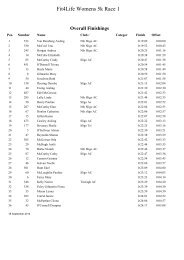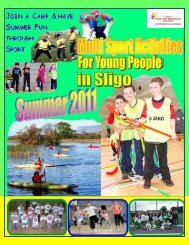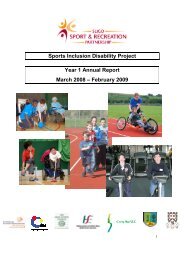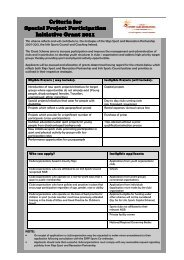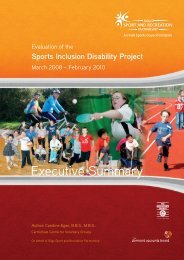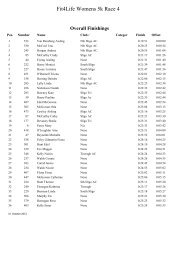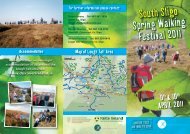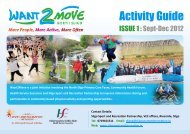Girls Active Programme - Sligo Sport and Recreation Partnership
Girls Active Programme - Sligo Sport and Recreation Partnership
Girls Active Programme - Sligo Sport and Recreation Partnership
You also want an ePaper? Increase the reach of your titles
YUMPU automatically turns print PDFs into web optimized ePapers that Google loves.
Discussion<br />
One co-ordinator who is also a PE teacher revealed<br />
that she has modified her practice of PE teaching<br />
to some extent as a direct result of her experience<br />
of the programme. In another school, participation<br />
in <strong>Girls</strong> <strong>Active</strong> is utilised by staff as a selling point<br />
to the parents of potential students.<br />
There is one school, not a case study school,<br />
that has been running two <strong>Girls</strong> <strong>Active</strong> groups<br />
for the past two years reflecting a strong belief<br />
by management in the value of the programme<br />
for its students. This school has subsequently<br />
also undertaken to develop other programmes to<br />
get students physically active such as a walking<br />
programme. In addition, some non-involved schools<br />
have asked to join the programme.<br />
5.3.3 Wider Impacts<br />
There is evidence that the programme has<br />
already achieved some broader impacts on the<br />
area of women in sport generally. One of the<br />
support agencies to the project, Donegal <strong>Sport</strong>s<br />
<strong>Partnership</strong>, has used the experience of <strong>Girls</strong><br />
<strong>Active</strong> to develop an initiative with women from<br />
the Travelling Community where the target group<br />
was actively involved in choosing activities <strong>and</strong><br />
determining the circumstances of its roll-out.<br />
Another support agency, <strong>Sligo</strong> <strong>Sport</strong> & <strong>Recreation</strong><br />
<strong>Partnership</strong>, recently organised a ‘Women in <strong>Sport</strong>’<br />
conference in collaboration with HSE West, where<br />
girls involved in <strong>Girls</strong> <strong>Active</strong> made contributions to<br />
the discussion <strong>and</strong> from which it is anticipated that<br />
a plan of action will be developed to promote <strong>and</strong><br />
value women’s participation in sport in the region.<br />
5.4 Concluding Remarks<br />
did not like certain aspects of traditional competitive<br />
sport such as the pressure to win. When given an<br />
opportunity through <strong>Girls</strong> <strong>Active</strong> to choose other<br />
kinds of physical activities, however, it is notable that<br />
these ‘non-sporty’ girls responded very positively<br />
through their attendance <strong>and</strong> their enthusiasm for<br />
the programme. The girls felt motivated by a desire<br />
to get fitter, to be more active <strong>and</strong> to have fun –<br />
common reasons why anyone might get involved in<br />
sport. It appears that what was missing for these<br />
girls previously was a supportive environment<br />
<strong>and</strong> accessible appropriate activities. As with the<br />
Traveller women mentioned above, it is likely that<br />
the lessons from the <strong>Girls</strong> <strong>Active</strong> experience may<br />
usefully be applied to raise the physical activity<br />
levels of other groups such as non-sporty boys.<br />
As has already been stated, the long term<br />
sustainability of individual programmes such as<br />
<strong>Girls</strong> <strong>Active</strong> may be dependent on the development<br />
of the concept of the ‘whole school’ environment<br />
where extra-curricular activity is viewed as cocurricular<br />
to the main programme of teaching<br />
undertaken by schools. The ‘whole school’<br />
approach also facilitates the formation of linkages<br />
across various school programmes such as <strong>Girls</strong><br />
<strong>Active</strong> <strong>and</strong> SPHE that will build synergies <strong>and</strong><br />
maintain them as central to the physical, emotional<br />
<strong>and</strong> intellectual development of all young people in<br />
school.<br />
Most of the girls participating in <strong>Girls</strong> <strong>Active</strong> had<br />
previously not been active in sports either inside<br />
or outside school. They put forward many reasons<br />
for this in the present study <strong>and</strong> most of those<br />
relate to a feeling of being excluded from such<br />
activities rather than negative feelings towards<br />
physical activity itself. They felt excluded because<br />
they were girls, because they were not ‘good’ at<br />
sport, because they did not like the limited range of<br />
sporting activity available to them, or because they<br />
30<br />
Evaluation of the <strong>Girls</strong> <strong>Active</strong> <strong>Programme</strong> - 2003 – 2005 Report



